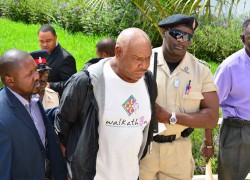
When Thomas Rigby appeared in the Supreme Court Friday morning he expected to be sentenced for damaging over $1 million worth of the newly paved John F. Kennedy Drive but his sentencing never happened.
On July 18th, Thomas Alexander Rigby pleaded not guilty to the charge of damage, but now he apparently had a change of heart.
According to reports, sometime between July 6th and 12th, the man intentionally damaged the newly paved road, causing $1,211,000 worth of damage.
On August 8th, the 45-year-old told the court he did it because he was not paid for assisting with the road works, as he is an ex-employee.
When proceedings began before Senior Supreme Court Justice Jon Isaacs, prosecutor Anthony Delaney told the court he wished to make an application to amend the section under which Rigby was charged – that is section 328 of the Penal Code.
The accused, he explained, should have been charged under section 338.
Justice Isaacs then asked whether the matter was indeed one for him to handle.
Mr. Delaney told him he had two options: to remit the matter back to the Magistrate’s Court or grant the application, have Rigby plea again and then sentence him.
Under section 328, Rigby’s punishment would be 10 years prison time compared to the just two years under section 338.
It is for that reason that Justice Isaacs explained that the matter was only sent to the Supreme Court because the magistrate believed the sentence was too great.
Magistrates only have the power to sentence a person to five years behind bars or in drug cases, seven years.
Justice Isaacs then asked Rigby if he objected to the prosecution’s amendment to which he said no.
Despite that, the judge decided he would remit the matter to the Magistrate’s Court, specifically to Acting Chief Magistrate Joyann Ferguson-Pratt to consider the application made by the prosecution.
Following the matter, the Bahama Journal asked Mr. Delaney whether charging Rigby under the wrong section was an oversight by the Attorney General’s office.
“I don’t have any idea because I’m not the person who looked at the file originally,” he told reporters.
“Having reviewed the file the court agreed that it was the wrong section so it will go back to the magistrate for that issue to be corrected and the file to be completed. This means the matter is still open so I’m not at liberty to discuss the matter any further.”
The Journal also asked the prosecutor whether being charged under the wrong section of the penal code is good grounds for Rigby to appeal.
“It does not mean that a crime was not committed,” Mr. Delaney said.
“This matter only happened this year. I think this is a case of where justice is really being done. He is now exposed to a lesser penalty for something that people think should attract a great penalty but the law is what it is.”
As for when Rigby will appear in the Magistrate’s Court, Mr. Delaney said that is a decision for the Supreme Court to make.


